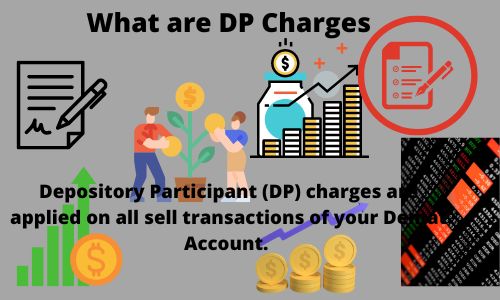DP Charges Definition
Depository Participant (DP) charges are applied on all sell transactions of your Demat Account. These charges are exclusive of brokerage and are not reflected in contract notes. DP charges are the revenue source for depositories and its participants.

DP charges are a flat transaction fee, irrespective of the quantity sold. Hence, the fee charged is per scrip and not the volume sold. So, these charges remain the same whether you sell 1 share or 100 shares.
Who levies DP charges ?
DP charges are levied by depositories as well as the depository participant. If the stock is part of Nifty, the tax is imposed by National Securities Depository Limited (NSDL). If the stock is part of BSE, the tax is levied by Central Depository Securities Limited (CSDL).
A depository participant is a mediator between depositories and the investor. For example, if your Demat account is maintained with Zerodha, it is the depository participant. Banks, financial institutes, stockbrokers are examples of depository participants.
Usually, depository participants levy four kinds of charges (or fees) for a Demat account transaction; they are, account opening fee, annual maintenance fee, custodian fee, and transaction fee.
Why are DP charges levied?
A stockbroker needs to become a depository participant to provide a Demat account to clients. Moreover, they need to pay a membership fee to NDSL or CDSL, to the tune of lakhs along with several other fixed costs and also advanced prepaid transaction charges. The brokers pass on these charges to their customers by an additional fee to reclaim these expenses.
How much DP charges are levied?
The charges levied by depositories are same for all sell transaction charges. The charges are:
- Demat transaction charges for CSDL: Rs. 13 plus Rs. 5.50
- Demat transaction charges for NSDL: Rs. 13 plus Rs. 4.50
Charges levied by depository participant can vary according to participants. The charges levied by Angel Broking are:
- 20 Per Debit Transaction
- 50 Per Debit Transaction For BSDA Clients
These charges are exclusive of all taxes.
| Type Of Charge | Charges |
| Account Maintenance Charges | Free For 1st Year From 2nd Year Onwards… Non-BSDA Clients ₹ 20 + Tax / Month For BSDA (Basic Services Demat Account) Clients: – Holding Value Less Than 50,000 : NIL – Holding Value Between 50,000 To 2,00,000 : ₹ 100 + Tax / Year |
| DP Charges | ₹ 20 Per Debit Transaction ₹ 50 Per Debit Transaction For BSDA Clients |
| Pledge Creation / Closure | ₹ 20 Per ISIN ₹ 50 Per ISIN For BSDA Clients |
| Demat | ₹ 50 Per Certificate |
| Remat | ₹ 50 Per Certificate + Actual CDSL Charges |
What is a depository?
A depository is an institution that works as a bank for securities (shares, debentures, GI securities, bonds, and MF). It holds securities in electronic format on behalf of the investor and provides services related to security transaction.
In India, NSDL and CDSL are the two central depositories, and each broker is a member of one through which it offers Demat services to investors.
Who are depository participants?
What are depository charges?
How are the DP charges calculated in Share Trading ?
Rs 20 per debit transaction
Rs 50 per transaction for BSDA transactions
These fees are excluding taxes.
Use a DP charges calculator to calculate total charges on your transaction.